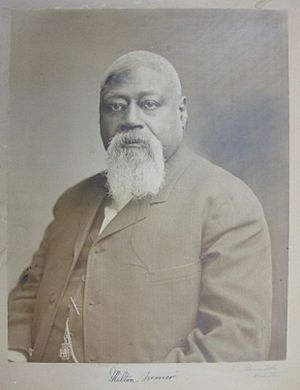James Milton Turner facts for kids
Quick facts for kids
James Milton Turner
|
|
|---|---|
 |
|
| Assistant superintendent of Missouri schools | |
| In office After Civil War – pre-1871 |
|
| United States Minister to Liberia | |
| In office March 1, 1871 – May 7, 1878 |
|
| President | Ulysses S. Grant Rutherford B. Hayes |
| Preceded by | James W. Mason |
| Succeeded by | John H. Smythe |
| Personal details | |
| Born | 1840 St. Louis, Missouri, U.S. |
| Died | Nov 1, 1915 (75 years old) Ardmore, Oklahoma, U.S. |
| Nationality | American |
| Political party | Republican (Radical Republicans) Democratic |
| Alma mater | Oberlin College John Berry Meachum's floating Freedom School |
| Military service | |
| Branch/service | U.S. Army (Union Army) |
James Milton Turner (born 1840 – died November 1, 1915) was an important leader, activist, teacher, and diplomat during the Reconstruction Era. This was the time after the American Civil War when the United States worked to rebuild the country and bring former enslaved people into society. Turner was the first African American to work as a diplomat for the U.S. government, serving as a consul general to Liberia.
Contents
Early Life and Education
Turner was born into slavery in St. Louis, Missouri. When he was a child, he was sold for $50 at the St. Louis US Courthouse. His father, John Turner, was an enslaved "horse doctor." He was allowed to keep some of the money he earned. Eventually, he bought freedom for himself and his family.
When James was 14, he went to Oberlin College in Ohio for a short time. After his father passed away in 1855, James had to go back to St. Louis to take care of his family. He then attended John Berry Meachum's Floating Freedom School. This unique school was on a steamboat on the Mississippi River. Meachum created it to get around a Missouri law from 1847 that made it illegal to educate Black people.
A Career in Public Service
Serving in the Civil War
When the American Civil War began, James Turner joined the Union Army. He worked as a personal assistant for Colonel Madison Miller. During his service, he was wounded, which caused him to have a permanent limp.
Helping to Build Schools
After the war, Missouri Governor Thomas Clement Fletcher, who was Colonel Miller's brother-in-law, appointed Turner as an assistant superintendent of schools. His job was to help set up schools for Black citizens in Missouri. He played a key role in starting the Lincoln Institute in Jefferson City. This was the first college for African Americans in Missouri. The Institute later changed its name to Lincoln University.
A Strong Political Voice
Turner was a strong speaker and a respected politician. He was a member of the Radical Republicans, a group that pushed for equal rights for African Americans. He was also a leader in the Missouri Equal Rights League. In 1868, he became the principal of Lincoln School in Kansas City, Missouri. This was the first school for Black students in that city.
Diplomat to Liberia
In 1871, Republican President Ulysses S. Grant chose Turner to be the consul general to Liberia. This meant he represented the U.S. government in Liberia. He moved to Monrovia, the capital of Liberia, and stayed in this important role until 1878. While there, he helped resolve the Grebo war.
Supporting Freedmen in the U.S.
When Turner returned to St. Louis, he helped Black refugees who were moving from the former Confederate states in the South. He also worked to organize these newly freed people and other Black citizens into a political group. Most of them joined the Republican Party, which was seen as the party of Abraham Lincoln. Turner also helped African Americans who moved to Kansas as part of the Exoduster Movement of 1879. Many of these migrants settled in St. Louis.
In 1881, Turner worked with Hannibal Carter to create the Freedmen’s Oklahoma Immigration Association. This group encouraged Black families to settle in Oklahoma. As the chairman of the Negro National Republican Committee, he suggested that U.S. Senator Blanche Bruce, another African American, should run for vice president in 1880.
Fighting for Native American Freedmen
In the last 20 years of his life, Turner fought for the rights of freedmen among the Cherokee, Choctaw, and Chickasaw tribes in the Indian Territory. After the Civil War, the U.S. government made new agreements with these tribes, who had supported the Confederacy. These agreements required the tribes to offer full citizenship to the freedmen who chose to stay in their lands. This was similar to how the U.S. government gave citizenship to freedmen across the country.
Turner successfully convinced Congress to give nearly 4,000 Cherokee Freedmen $75,000. This money came from funds the U.S. government had paid the Cherokee tribe in 1888 for their land. The Cherokee tribe had not wanted to share this money for communal lands with the freedmen at first.
Death and Legacy
In late 1915, Turner was in Ardmore, Oklahoma, working on a legal case for the freedmen. A nearby railroad car exploded, and debris cut his left hand. An infection developed in the wound, and Turner passed away on November 1, 1915, in Ardmore.
The Turner School in the Meacham Park area of Kirkwood, Missouri, was named after him. The school opened in 1924 and was renamed in 1932. It closed during the 1975-1976 school year. This was done to help address the racial separation that its African American students were experiencing in the Kirkwood School District.
See also
 | James B. Knighten |
 | Azellia White |
 | Willa Brown |

